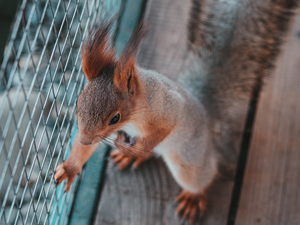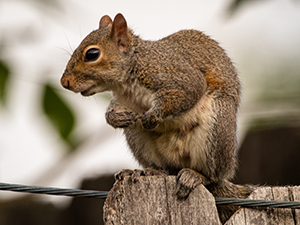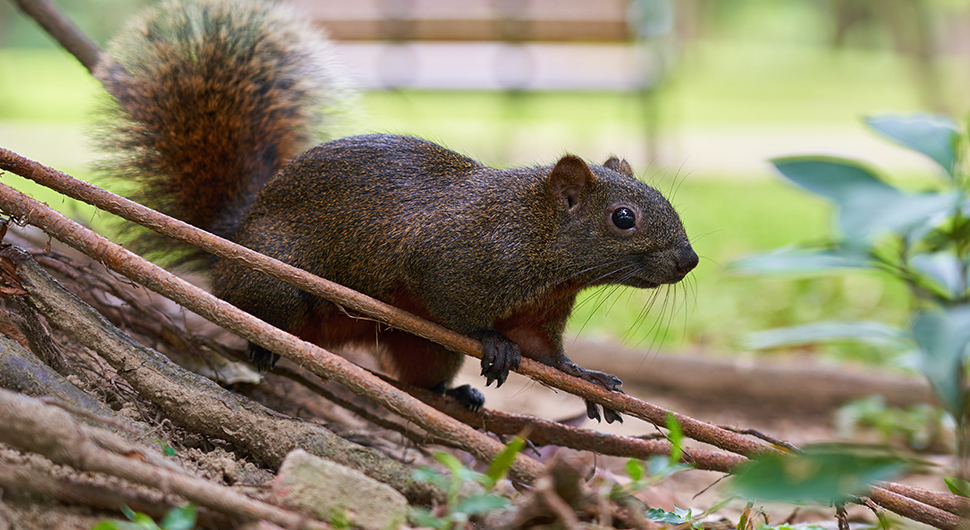There's no denying how cute squirrels are, but they can also be quite a nuisance for homeowners. Without proper barriers in place, the bushy-tailed creatures can get into your garden or home and wreak havoc.
Squirrels tend to enter homes through:
- Attics
- Chimneys
- Electrical wire openings
- Exposed utility pipes
- Foundation vents
- Rotted boards
- Soffits
- Windows
Preventative maintenance is crucial because once squirrels get in, it can be hard to get them out. Not only that, but they can cause substantial damage trying to escape an enclosed space.
In many cases, wire mesh is an excellent solution. If you're like a lot of homeowners, you might be wondering, Can squirrels chew through wire mesh, and if so, which kinds?
Chicken wire (also known as hex mesh) has many uses, particularly in the gardening and home improvement domains. However, it's not recommended for squirrel exclusion, as most rodents can chew through it. Keep reading for a breakdown on the best type of mesh for keeping squirrels out.
What’s the Best Wire Mesh for Squirrel Control?
 Squirrels are inherently resourceful, and you shouldn't put it past them to find any and all unsecured entries to your home, garden, or shed. Although chicken wire and other lightweight wire mesh materials with large weaves are easy for them to breach, heavy-duty woven mesh with a tight weave should do the trick.
Squirrels are inherently resourceful, and you shouldn't put it past them to find any and all unsecured entries to your home, garden, or shed. Although chicken wire and other lightweight wire mesh materials with large weaves are easy for them to breach, heavy-duty woven mesh with a tight weave should do the trick.
The squirrel-control wire mesh products from TWP Inc. have relatively small openings, all under a quarter of an inch. Choose from highly resilient welded stainless steel mesh with a standard mill finish, galvanized stainless steel hardware cloth, or poly-coated galvanized stainless steel wire mesh. Galvanization involves dipping the steel into molten zinc, which creates a protective alloy coating, making it ideal for squirrel-proofing a home.
6 Tips for Squirrel-Proofing Your Home & Landscaping
Using the right material is the first step in keeping squirrels and other rodents at bay. That being said, if you want to pull out all the stops and keep critters out once and for all, check out the expert tips below.
1) Before installing wire mesh barriers around your home, make sure all rodents are out. Additionally, repair or replace any potential openings, such as rotting boards or broken windows.
2) Using squirrel-exclusion wire mesh, cover all access points from the inside if possible, including your attic vents and foundation vents. For your chimney, an exterior cap will work.

3) To squirrel-proof your garden, create a fence out of heavy-duty wire mesh at least 30 inches above-ground and six or more inches below.
4) To keep squirrels out of the trees in your yard, you can install mesh fencing around the trunk. Trimming low-hanging branches will help keep them out as well.
5) Make sure all food sources are cleaned up or secured. This includes trash bins, birdseed, and pet food, along with any nuts, fruit, or berries growing on your property.
6) Continue to check your barriers periodically and repair them as needed. Also, keep an eye out for new access points.
Keeping squirrels off your property doesn't have to be a herculean task. The more proactive and persistent you are about pest control, the easier it will be.
Wire Mesh for Pest Control from TWP Inc.
When you browse pest-proofing products from TWP Inc., you'll find a variety of rodent-control wire mesh materials for excluding squirrels, chipmunks, gophers, vole, mice, and rats. We also carry insect screen mesh and mesh materials for keeping bats, bees, snakes, snails, raccoons, and possums away. Whether you have years of experience with do-it-yourself projects or are just starting to explore the DIY realm, TWP Inc. has the materials you need to get started.
Our women-owned business has been a leading supplier of industrial-grade wire mesh for over half a century. We're committed to helping our customers with all types of home projects and offer a range of personalized services, including cleaning, measuring, slitting, and laser cutting. Order your pest-control wire mesh today or request a quote for a custom order.
To have your DIY project featured in our online gallery, upload your photos to Instagram using the hashtag #TWPWireMesh.



 Squirrels are inherently resourceful, and you shouldn't put it past them to find any and all unsecured entries to your home,
Squirrels are inherently resourceful, and you shouldn't put it past them to find any and all unsecured entries to your home, 